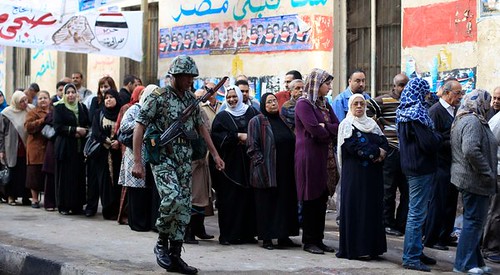
Soldiers patrols the lines of voters in Egypt who are participating in the first post-uprising elections on November 28, 2011. Egypt has been rocked by unrest over the last year., a photo by Pan-African News Wire File Photos on Flickr.
Brothers head for landslide
Islamist political parties -- led by the Muslim Brotherhood's Freedom and Justice Party -- won 70 per cent of the vote in the first two stages of parliamentary elections, and expect to win the same in the final stage, Gamal Essam El-Din reports
-----------------------------------------------
In the first two stages of parliamentary elections Islamist parties opened a commanding lead over their opponents. Few expect the results of the third and final change to be different.
The third stage of the poll, on 3 and 4 January, covers the governorates of Qalioubiya, Gharbiya, Daqahliya, Qena, Minya, South Sinai, North Sinai, Marsa Matrouh and Al-Wadi Al-Gadid. Run- off elections will be held on 10 and 11 January.
Of the 150 seats up for grabs 50 will be decided on a first past-the-post system and the remaining 100 be distributed proportionally among party lists. The fate of just over 2,000 candidates will be decided by the 14 million who have yet to vote.
The first two stages -- held between 28 November and 22 December -- were supposed to see 348 MPs returned. Legal disputes and election irregularities, however, have forced the Supreme Elections Committee (SEC) to delay the results in 17 seats.
Of the 331 seats already declared the vast majority have gone to the two leading Islamist parties, the Muslim Brotherhood's Freedom and Justice Party (FJP) and the Salafist Nour.
It was the latter's performance that took commentators by surprise. While the FJP's success was expected, says political analyst Manar El-Shorbagui, "I never imagined the Salafist party clinching such a high share of the vote."
"Given it is a newcomer to the political scene and espouses a radical Islamist agenda I had expected the Salafis to be hovering around five per cent."
The Nour won its highest number of votes in Upper Egyptian governorates where it outperformed its equally radical rival, Al-Gamaa Al-Islamiya's Reconstruction and Development Party (RDP). RDP founder Safwat Abdel-Ghani has said that many of his party's supporters will have voted for the Nour individual candidates. The RDP, included on the same party lists as the Nour, has so far won six seats. Include the Wasat victories -- the party is a moderate offshoot of the Brotherhood -- in the total and the Islamists won 73 per cent of seats in the first two stages.
In a statement issued on 24 December, FJP officials expressed their gratitude to the Egyptian people for "bestowing their trust on us".
The statement boasted that "the Democratic Alliance, which included 10 non-Islamist parties and was led by the FJP, helped at least 15 prominent candidates from the Alliance's partners to win seats". They include Wahid Abdel-Meguid, an Al-Ahram political analyst; Mahmoud El-Khodeiri, a reformist judge; Saad Abboud, a Nasserist lawyer and a former MP; Mohamed Abdel-Moneim El-Sawy, former minister of culture and founder of the Civilisation Party; Kamal Abu Eita, a political activist and a member of the Nasserist Karama Party and Mohamed El-Said Idris, Al-Ahram political analyst and a leading member of Kifaya.
"Not only have FJP candidates defeated their rivals," the statement continued, "but the chairmen of 10 FJP provincial offices have been elected to the new parliament."
The majority of FJP provincial leaders are former Muslim Brotherhood deputies.
The FJP also boasted that the liberal Egyptian Bloc parties had failed to make an electoral breakthrough despite support from the Coptic Orthodox Church.
"This Bloc had the backing of Copts but it was not enough to overcome the popularity of our candidates," said the statement.
The statement also blamed the poor performance of the Wafd Party on its opting to leave the FJP-led Democratic Alliance.
The two main liberal forces -- the Egyptian Bloc and the Wafd -- have so far won 26 and 27 seats.
FJP officials expect its candidates to continue to dominate the polls in the third stage which includes Gharbiya, Daqahliya, Qalioubiya and Minya, areas in which the Muslim Brotherhood has strong grassroots organisation.
The third stage sees some of the FJP's leading members standing as candidates. They include former Muslim Brotherhood deputies Saad El-Katatni, the FJP's secretary-general in Minya; Saad El-Husseini, a member of the Muslim Brotherhood's Guidance Office in Gharbiya; Mohamed El-Beltagui, a professor at Ain Shams University and Mohsen Radi, a journalist, both in Qalioubiya.
While in Delta governorates the FJP is expected to have an easy ride, Upper Egypt, South and North Sinai, Marsa Matrouh and Al-Wadi Al-Gadid, where tribal and clan connections hold sway, presents a greater challenge.
© Copyright Al-Ahram Weekly. All rights reserved
Al-Ahram Weekly Online : Located at: http://weekly.ahram.org.eg/2011/1078/eg1.html
No comments:
Post a Comment